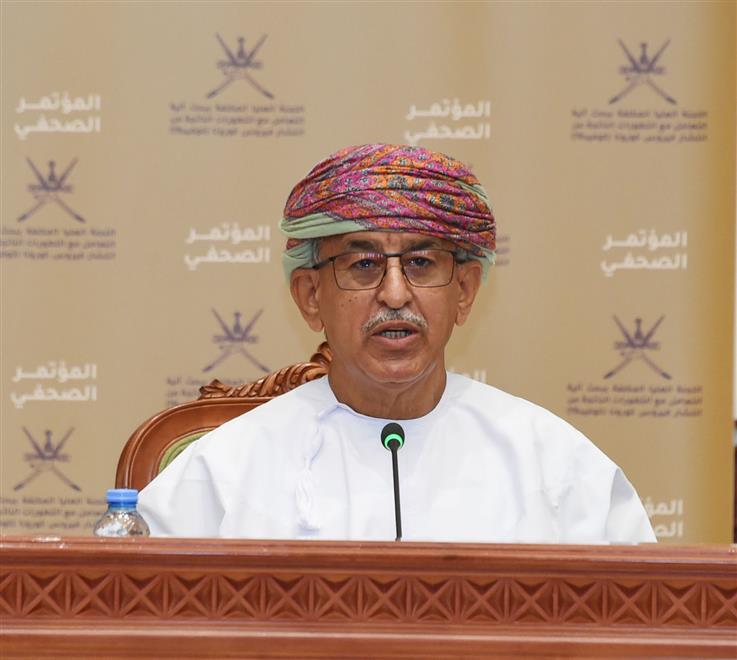

Although there had been a decrease in Covid-19 cases since mid of October, last year, the number of patients in intensive care units has doubled to 102, within two weeks only. The number was only 51 before January 21.
This was stated by Dr Ahmed bin Mohammad al Saeedi, Minister of Health, who pointed out that the sudden increase in cases is “a very worrying and dangerous indicator.”
During the press conference of the Supreme Committee tasked with tackling developments resulting from coronavirus (Covid-19) pandemic, Dr Al Saeedi said that “potential lockdown steps will be the last resort (of the pandemic situation)” and that the panel hopes not to go that far. “It is our duty to protect ourselves and society through strict adherence to precautionary measures,” he added.
He said that the closure of the Sultanate’s airports is “under study and deliberation” by the Supreme Committee, which, he hoped, would not be compelled to re-lock Omani airports for international flights “because that will cause immense social and economic losses”.
So far, the Sultanate has registered six cases of the new Covid-19 variant, notorious for their swift propagation, said the minister, noting that the most globally common among the new variants is the British strain, but, he said that the Sultanate has advanced facilities to detect it, through all labs — whether at the Ministry of Health or Sultan Qaboos University or private hospitals.
He said that till date the Sultanate has conducted 1.550 million tests, and that the number of PfizerBionNTech vaccination doses distributed stood at 39,772 — given to 27,400 people as a first shot and to 12,272 people as a second dose.
“We all pay the price because of some irresponsible and careless group of people. Not wearing a mask is a crime.
VACCINES
Regarding the delay in the arrival of Pfizer vaccine, Dr Al Saeedi clarified, “The company was in the process of developing its factories, which led to a temporary interruption in the export of the vaccine. However, the manufacturer confirmed that six week delay will not affect those who took the first dose”.
He indicated that 450,000 doses of the vaccine have been reserved and will arrive this month. Priority will be given to those who received the first dose. There are also 2.5 million doses which have been reserved to the Sultanate from vaccine manufacturers, the minister added, hoping that before the middle of this year, all the first target groups should receive the vaccine.
Besides, Dr Al Saeedi clarified that a person who has received the Pfizer vaccine as a first dose cannot take the Astrazeneca vaccine as a second dose. “The efficacy of the Oxford-AstraZeneca vaccine ranges between 86-90 per cent and Pfizer is 95 per cent. The Sultanate will not go for any vaccine without being 100 per cent sure of its safety’’, he confirmed.
BUSINESS ACTIVITIES
Addressing the press conference, Qais bin Mohammed al Yousuf, Minister of Commerce, Industry and Investment Promotion, member of the Supreme Committee, said that most business activities will remain open as of now. He pointed out that the Sultanate proved its ability to address such crises.
EDUCATION SECTOR
Dr Abdullah bin Khamis Ambusaidi, Under Secretary Ministry of Education for Education said that the assessment of students depends on the medium of learning. He said that online students will be assessed in accordance with online study modes and, if proved unachievable, their respective parents may approach the school to find an alternative method of assessment.
PCR TESTS
Dr Amal al Ma’ani, Director of Contagion Control Department at the Ministry of Health, said that the two vaccines available in the Sultanate will cover the new variants of virus and that the PCR test will show ‘positive’ result within not more than three months. Any positive result afterwards, will be an indicator that the tested person is indeed infected with the virus, either in its old or new variant, she added.
She said that there are six confirmed cases and 96 suspected cases of new genetic mutations in the Sultanate. “The new strains discovered in the Sultanate are from the same strains found in Britain, Brazil and South Africa. To reach societal immunity, we have to vaccinate at least 60 per cent of the population, and we started with 20 per cent of the high risk’’, Dr Al Ma’ani noted.
“Keeping the vaccine at temperatures lower than the imposed degrees may lead to a decline in the efficiency of the vaccine. The effectiveness goes through several experiments, as well as the study after applying the clinical trial. There is no specific examination for the old or new strain, but after taking the test, it is possible to know what kind of strains the person has. The person who received the vaccine does not mean that he is not a carrier of the infection’’, she clarified.
Oman Observer is now on the WhatsApp channel. Click here



